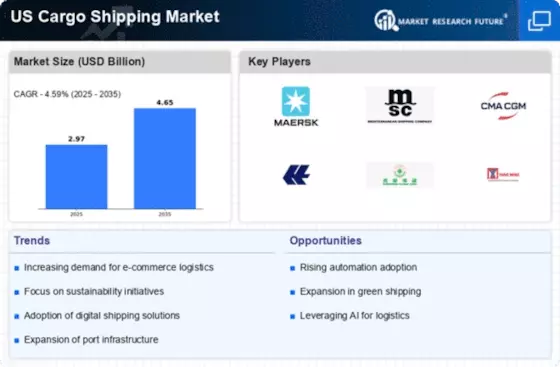E-commerce Growth
The rapid expansion of e-commerce in the United States is a pivotal driver for the US Cargo Shipping Market. As online shopping continues to gain traction, the demand for efficient cargo shipping solutions has surged. In 2025, e-commerce sales in the US reached approximately 1 trillion USD, indicating a robust market that necessitates reliable shipping services. This growth compels logistics companies to enhance their shipping capabilities, ensuring timely deliveries to meet consumer expectations. Consequently, the US Cargo Shipping Market is likely to experience increased investments in technology and infrastructure to accommodate the rising volume of goods transported. The integration of advanced tracking systems and automated warehousing solutions may further streamline operations, thereby enhancing overall efficiency in the cargo shipping sector.
Global Trade Dynamics
The evolving landscape of The Cargo Shipping Industry. As trade agreements and tariffs fluctuate, the flow of goods between the US and its trading partners is directly impacted. For instance, the United States-Mexico-Canada Agreement (USMCA) has facilitated smoother trade relations, resulting in increased cargo shipments across North America. In 2025, the volume of cargo shipped to and from the US reached approximately 2.5 billion tons, underscoring the significance of international trade in driving shipping demand. The US Cargo Shipping Market must remain agile to adapt to these changes, ensuring that shipping routes and logistics strategies align with the current trade environment.
Regulatory Compliance
Regulatory compliance remains a critical driver for the US Cargo Shipping Market. The US government enforces stringent regulations concerning safety, environmental standards, and trade practices. Compliance with the Jones Act, which mandates that goods transported between US ports be carried on US-built vessels, significantly influences shipping operations. Additionally, the Environmental Protection Agency (EPA) has implemented regulations aimed at reducing emissions from cargo ships, prompting companies to invest in cleaner technologies. As the industry adapts to these regulations, it may lead to increased operational costs; however, it also presents opportunities for innovation. Companies that proactively embrace compliance measures may gain a competitive edge, positioning themselves favorably within the US Cargo Shipping Market.
Consumer Demand for Speed
The increasing consumer demand for faster shipping options is a significant driver of the US Cargo Shipping Market. As consumers become accustomed to rapid delivery services, particularly from major e-commerce platforms, the pressure on shipping companies to meet these expectations intensifies. In 2025, nearly 70% of consumers indicated a preference for same-day or next-day delivery options, prompting logistics providers to adapt their operations accordingly. This trend necessitates the optimization of supply chains and the implementation of advanced logistics solutions. Consequently, the US Cargo Shipping Market is likely to see a surge in investments aimed at enhancing delivery speed and efficiency, ultimately reshaping the competitive landscape.
Technological Advancements
Technological advancements are revolutionizing the US Cargo Shipping Market, enhancing efficiency and reducing operational costs. Innovations such as blockchain technology, artificial intelligence, and the Internet of Things (IoT) are being integrated into shipping operations. For example, blockchain can improve transparency in supply chains, while AI can optimize routing and inventory management. In 2025, it is estimated that the adoption of these technologies could reduce shipping costs by up to 20%, making it a crucial factor for companies aiming to remain competitive. As the industry embraces these advancements, the US Cargo Shipping Market is likely to witness a transformation in how goods are transported, tracked, and delivered.

















